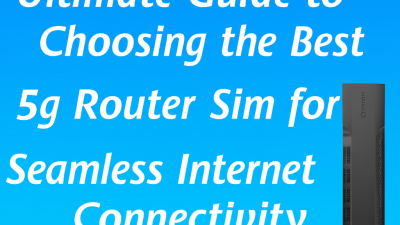In the rapidly evolving landscape of digital connectivity, selecting the right 5G Router Sim is crucial for ensuring seamless internet access. As 5G technology gains momentum, the demand for robust and reliable internet solutions continues to rise. This guide delves into the essential aspects of choosing the best 5G Router Sim, catering to both ordinary users and tech enthusiasts who seek optimal performance.
From understanding different SIM types to evaluating network coverage, speed, and compatibility with various devices, we aim to provide comprehensive insights that empower consumers to make informed decisions. Whether you are looking to enhance your home office setup or upgrade your mobile internet experience, a well-chosen 5G Router Sim can significantly improve your connectivity, making it a vital consideration in today’s digital age.

When selecting a 5G router SIM card, there are several key factors to consider to ensure optimal internet connectivity. Firstly, check the coverage areas provided by the service provider. Not all providers offer the same level of 5G coverage, so it’s essential to choose a SIM that guarantees robust and reliable service in your specific location. Look for providers that offer detailed maps of their coverage and consider customer reviews about their network reliability in your area.
Another important factor is data plans and pricing. Different providers have various data packages, ranging from unlimited plans to limited data allowances. Evaluate your internet usage habits—whether for streaming, gaming, or casual browsing—to select a SIM card that aligns with your needs and budget. Additionally, pay attention to roaming capabilities, as some SIM cards may offer better options for international travel. Ultimately, understanding these factors will guide you in making an informed decision when choosing the best 5G router SIM for seamless internet connectivity.
When selecting a 5G SIM for your router, it's crucial to examine the data plans available and identify what features are most aligned with your internet needs. According to the Global System for Mobile Communications (GSMA), 5G subscriptions are projected to exceed 1.7 billion by 2025, highlighting the growing demand for seamless connectivity. When comparing plans, look for data limits, speed thresholds, and the types of included features, such as unlimited data versus capped data plans.
Another vital factor to consider is network coverage and reliability. A report from OpenSignal reveals that 5G availability in urban areas is significantly higher and can reach upward of 75% in many major cities. Users should prioritize SIM cards that offer robust network access in their locations to ensure optimal performance. Additionally, factors like latency and customer service quality can greatly impact your overall experience; research feedback from other users and consult provider ratings to make informed choices. As you evaluate your options, keep in mind how your data usage patterns—whether for streaming, gaming, or remote work—interact with the plan's features to ensure you choose a SIM that meets your specific needs.
When selecting a 5G router SIM, understanding the coverage area and network compatibility is crucial for ensuring seamless internet connectivity. According to a report by the Global Mobile Suppliers Association (GSA), as of mid-2023, 5G networks were available in over 60 countries, with a growth rate that is projected to reach around 1.5 billion global connections by 2025. This expansive coverage indicates that choosing a SIM that operates on a network with robust 5G infrastructure can significantly affect your internet experience.
Moreover, network compatibility plays a pivotal role in harnessing the full potential of 5G technology. A survey conducted by OpenSignal revealed that while some regions exhibit impressive 5G download speeds averaging 300 Mbps, others may lag significantly, showcasing speeds of less than 50 Mbps due to limited network support. It is essential to research which carriers offer the best 5G coverage in your particular area, as a well-suited SIM will optimize your router's performance and ensure you're leveraging the advantages of 5G connectivity effectively.
When choosing the right 5G SIM for your router, understanding your speed requirements is paramount. The speed capabilities of 5G networks greatly vary depending on the location, network provider, and the type of plan you choose. A high-speed plan may promise download speeds exceeding 1 Gbps in optimal conditions. However, it’s essential to assess your actual usage—whether for intensive tasks like gaming and streaming in 4K or more casual use like browsing and video conferencing. Tailoring your choice to your specific needs will enhance your overall internet experience.
Furthermore, it's crucial to consider the coverage area provided by different carriers. Even the fastest plan will fall short if the network does not cover your home or office. Researching which SIM offers strong 5G coverage in your locale can make a significant difference. Additionally, look for options that include unlimited data or high data caps if you expect heavy usage. By aligning your speed requirements with reliable provider coverage, you can ensure a seamless, uninterrupted internet connection that meets your demands.
When it comes to enhancing your 5G internet experience, testing the performance of your router sim is crucial. Begin by conducting speed tests at different times of the day to identify peak usage periods and analyze the variations in download and upload speeds. This will help you determine if the connection is consistently reliable or if specific times lead to congestion. Consider using specialized apps that monitor network performance, providing metrics on latency, jitter, and packet loss, all of which can impact streaming and gaming experiences.
In addition to speed tests, optimizing your router settings can significantly improve connectivity. Start by placing the router in a central location within your home, free from obstructions. Adjusting the frequency band from 2.4 GHz to 5 GHz can also help if interference is an issue, as the latter offers higher speeds over shorter distances. Lastly, regularly updating the router's firmware ensures optimal performance, granting access to the latest features and security patches that enhance overall functionality.








